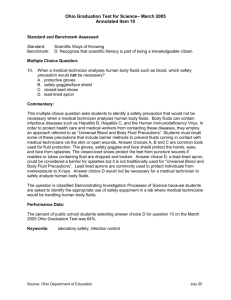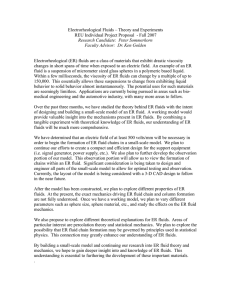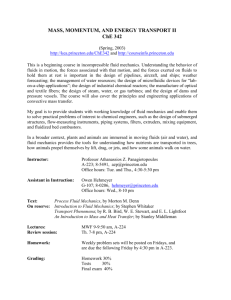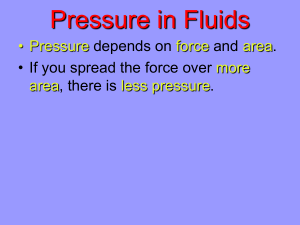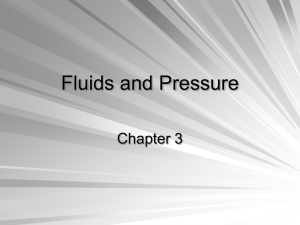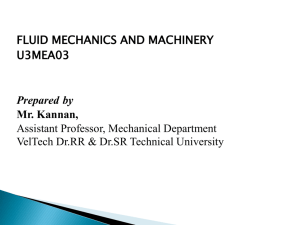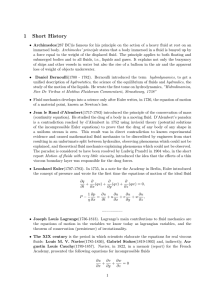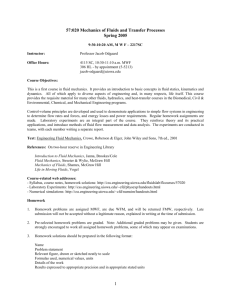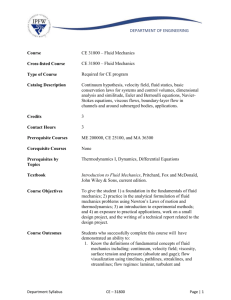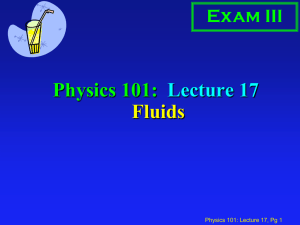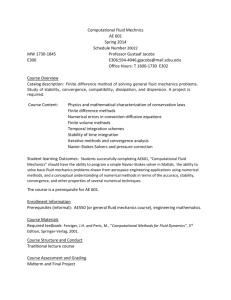Identification - Khazar University
advertisement
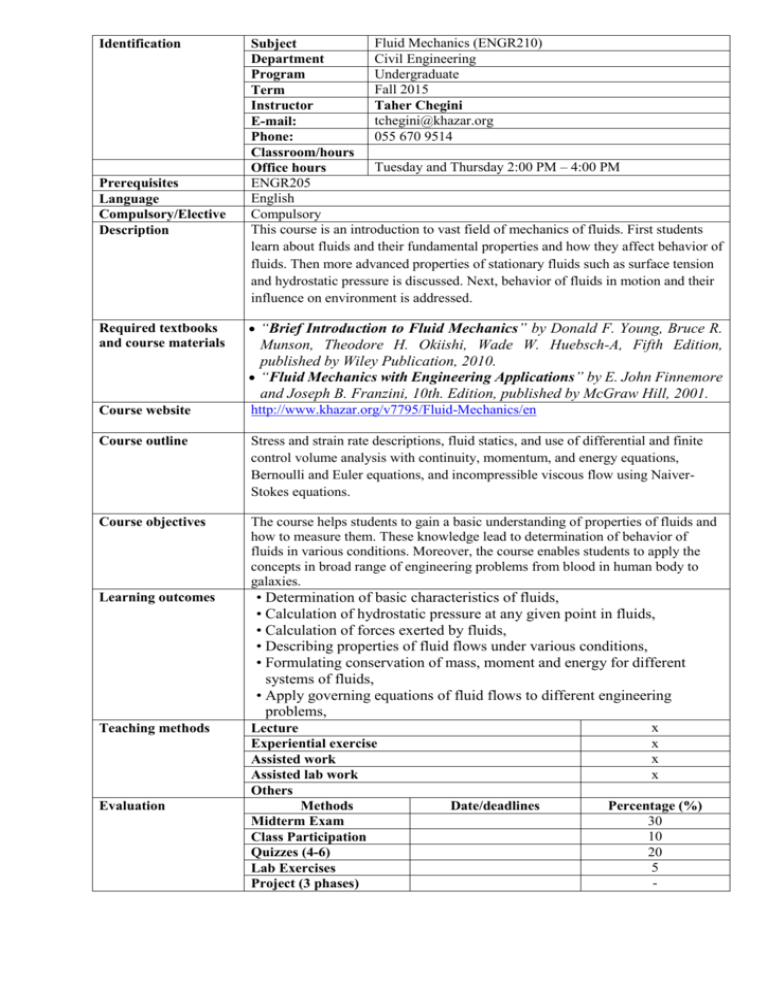
Identification Prerequisites Language Compulsory/Elective Description Fluid Mechanics (ENGR210) Subject Civil Engineering Department Undergraduate Program Fall 2015 Term Instructor Taher Chegini tchegini@khazar.org E-mail: 055 670 9514 Phone: Classroom/hours Tuesday and Thursday 2:00 PM – 4:00 PM Office hours ENGR205 English Compulsory This course is an introduction to vast field of mechanics of fluids. First students learn about fluids and their fundamental properties and how they affect behavior of fluids. Then more advanced properties of stationary fluids such as surface tension and hydrostatic pressure is discussed. Next, behavior of fluids in motion and their influence on environment is addressed. Required textbooks and course materials “Brief Introduction to Fluid Mechanics” by Donald F. Young, Bruce R. Course website http://www.khazar.org/v7795/Fluid-Mechanics/en Course outline Stress and strain rate descriptions, fluid statics, and use of differential and finite control volume analysis with continuity, momentum, and energy equations, Bernoulli and Euler equations, and incompressible viscous flow using NaiverStokes equations. Course objectives The course helps students to gain a basic understanding of properties of fluids and how to measure them. These knowledge lead to determination of behavior of fluids in various conditions. Moreover, the course enables students to apply the concepts in broad range of engineering problems from blood in human body to galaxies. Learning outcomes Teaching methods Evaluation Munson, Theodore H. Okiishi, Wade W. Huebsch-A, Fifth Edition, published by Wiley Publication, 2010. “Fluid Mechanics with Engineering Applications” by E. John Finnemore and Joseph B. Franzini, 10th. Edition, published by McGraw Hill, 2001. • Determination of basic characteristics of fluids, • Calculation of hydrostatic pressure at any given point in fluids, • Calculation of forces exerted by fluids, • Describing properties of fluid flows under various conditions, • Formulating conservation of mass, moment and energy for different systems of fluids, • Apply governing equations of fluid flows to different engineering problems, Lecture Experiential exercise Assisted work Assisted lab work Others Methods Midterm Exam Class Participation Quizzes (4-6) Lab Exercises Project (3 phases) x x x x Date/deadlines Percentage (%) 30 10 20 5 - Final Exam Total Policy 35 100 • NO CELL PHONES are allowed during lecture and lab sessions. PLEASE turn them off before lecture! (Not silent or vibrating mode). This is a university policy and violators will be reprimanded accordingly. • Participation and interaction in classes are more important than just attendance. • No late assignments will be accepted without prior arrangement with the instructor for acceptable excuses. Medical and family emergency will be considered on case-by-case basis. • No late homework will be accepted. Homework is to be completed on an individual basis. Students may discuss homework with classmates, but students are responsible for your own work. If students have consulted classmates, please note the individuals name on the top of students’ assignment. • Quizzes may be given unannounced throughout the term and will count as one homework. There will be no make-up quizzes. • No make-up exams. If students miss an exam, a zero score will be assigned to the missed exam. • If students should miss class due to personal emergency or medical reasons, please notify the instructor by email immediately. A doctor’s note will be required for make-up work. • Students are responsible for completing the reading assigned from the textbook related to the covered topics and for checking email regularly for important information and announcements related to the course. • University policy on academic honesty concerning exams and individual work will be strictly enforced. • BE ON TIME! Tentative Schedule Date/Day Week Topics Textbook/Assignments 1 (Tentative) 15-17 Sentyabr 2 22-24 Sentyabr 29 Sentyabr Viscosity and Compressibility, Surface Tension + -1 Oktyabr Quiz Chapter 1 3 6-8 Oktyabr Introduction to Fluid Statics Chapter 2 4 13-15 Oktyabr Pressure calculation at a point + Lab Chapter 2 5 20-22 Oktyabr Pressure variations and measurements Chapter 2 6 27-29 Oktyabr Hydrostatic force calculations + Quiz Chapter 2 7 3-5 Study Group No. 1 and Midterm Chapters 1 and 2 Introduction to Fluid Kinematics + Lab Chapter 3 Velocity and acceleration field Chapter 3 Bernoulli equation + Quiz Chapter 3 1-3 Dekabr Introduction to Control Volume analysis Chapter 4 8-10 Dekabr Reynolds Transport Theorem and conservation of mass Chapter 4 13 15-17 Dekabr Conservation of Momentum and Energy + Quiz Chapter 4 14 22-24 Dekabr Study Group No. 2 Chapters 3 and 4 15 Introduction to Fluid Mechanics Chapter 1 Fluid Properties; Dimensions and Units Chapter 1 8 Noyabr 10-12 9 Noyabr 17-19 10 Noyabr 24-26 11 Noyabr 12 Final Exam 16 This syllabus is a guide for the course and any modifications to it will be announced in advance.
